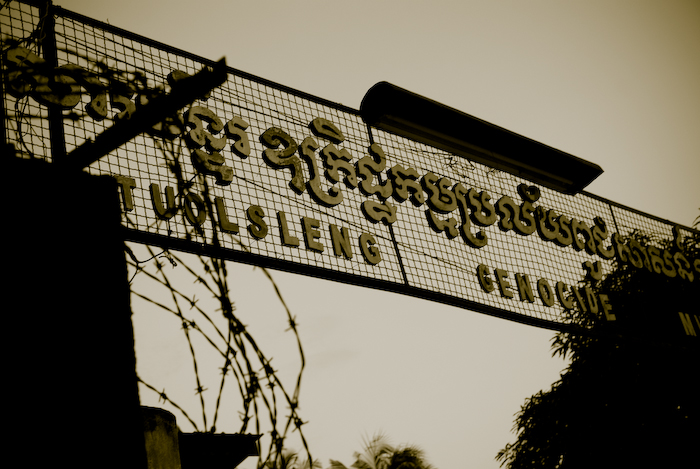phnom penh. a good lesson.

Responsible tourism was a theme that kept popping into my head during our week spent in Cambodia. Four years later, Siem Reap town was barely recognisable. A massive boom in tourism does bring the good and the evil. The average local on the street now has a little more luxuries than before and their values now modernised and is driven by the greed of capitalism. But over and above that, the temples at Angkor – especially off-the-beaten track ones which you stumble upon coincidently with no other soul present, under a cultivating sunset or with just one other person whom you end up chatting for longer than you expect, are breathtaking regal.
Five hours of bus ride took us to the big city of Phnom Penh and we emerged in a chaos of tuk-tuk drivers screaming for you. Competition is stiff, the first sign showing the challenge of surviving in a big city. Since our stay coincided with my birthday, we upped our standards from a guesthouse to a nicer guesthouse. The Boddhi Tree group of guesthouses and hotels set up by a European owner satisfied my silent responsibility of ‘responsible tourism’. We stayed at Boddhi Tree Umma and felt at home with their lovely courtyard cafe and tastefully simple rooms.
Since we began traveling, choosing what we eat was a regular topic of discussion. It probably was a small evolution that brought us from idea to experiment and finally to execution. The Boddhi Tree cafe served us freshly prepared fries – not frozen from the sealed bag. Already thumbs up. But as I read their menu back-to-back out of boredom, I arrived at a final page stating their business policies. The aim of these cafes and rooms is to educate and empower local community participation so they are able to work and earn a decent living and that is the basis of how to build a solid society with values.
Why is it important? In a country fresh out from a dark history, where children are better off peddling goods to tourists than going to school, where you can shoot bazookas and M-16s for the price of a bottle of wine and where the illegal is more lucrative than the legal, moral values are so paramount to move forward.
Halfway through my visit to S-16, the Khmer Rouge’s torture cells, I couldn’t continue stepping into the empty rooms, staring at the rusty bed and the left-over torture devices and trying to make sense of what and why all these went on. Until today, I still can’t. And so I sat at the courtyard while the visitors one-by-one slowly snapped their photos and stepped out into a better world out of the gates. A monk slowly inched to me and asked for help with his English homework. ‘Early’ and ‘late’, that was the topic of our 20 minutes lesson. By then, the sun waved goodbye and the gates to S-16 were closing. We bade our goodbyes and I crossed the street back to my room at Boddhi Tree Umma contented with my responsible tourism.
- 2 September 2008
- cambodia, jet set
- No comments
- #